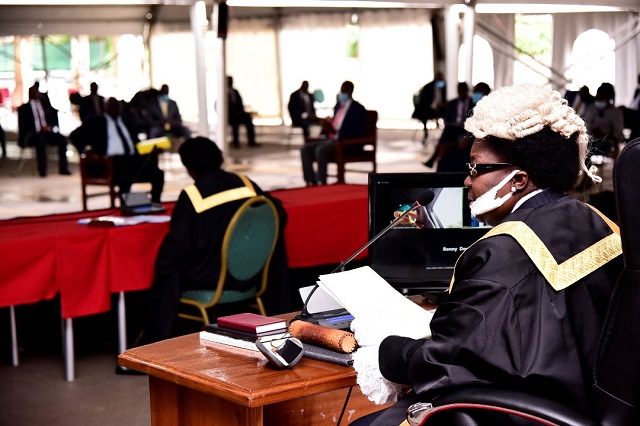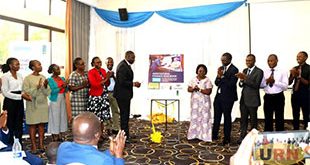
Kampala, Uganda | THE INDEPENDENT | Parliament has approved government proposed political party regulations requiring political groupings to waive a requirement of holding delegates conferences to determine their official candidates for different leadership positions.
This means political parties will now have the option of allowing their top organs to handpick the party candidates to compete in the coming 2021 general elections among others.
The House approved the regulation following a presentation of a report by the Legal and Parliamentary Affairs Committee. The report was presented by the Committee chairperson Oboth Jacob Marksons.
The regulations were presented before Parliament last week Thursday by the Minister of Justice and Constitutional Affairs Ephraim Kamuntu seeking to guide the conduct of meetings and internal party elections at a time when the world is challenged with managing crowds in the wake of the COVID-19 pandemic.
Under the regulation, the government waives the requirement of holding delegates conferences to determine party official candidates for different leadership positions. Instead, it is suggested that candidates be chosen by an electoral college and that the political parties should hold virtual meetings through video conferencing and circulate resolutions to members who are not physically present.
The members will then take a vote on major decisions by signing to assent or dissent. The parties will also be required to hold elections in a phased manner. The government argues that given the COVID-19 pandemic, instead of risking the lives of members, the parties can disregard their constitutions by giving power to the executive committee to employ any of the suggested procedures.
Minister Kamuntu defended the regulations saying that given the prevailing health situation, it is not safe to hold elections in the usual traditional manner and that protecting the lives of citizens and their property is the first duty of government.
Now according to the West Budama North MP Jacob Oboth, the regulations should only apply to infectious diseases that are notified under sections 10, 11 and 27 of the Public Health Act Cap 281 and that they should be expanded to include other matters that can affect the holding of normal party activities including exigencies posed by a state of emergency or a state of war in Uganda.
He also recommended that the regulations should end upon the lifting of the restrictions under which they have been brought.
Oboth said that the challenges posed by the COVID-19 pandemic require the imposing of the regulations in order for political parties and organizations to carry out their internal political activities in preparation for the forthcoming elections and that the regulations are not only essential but necessary in light of the challenges posed by the virus since normal internal political party processes cannot be held as has been during normal elections.
The report was signed by the majority 20 ruling NRM MPs sitting on the committee out of the 29 membership. Nine other MPs including Opposition legislators on the committee did not sign the report. In the minority report presented by Busiro East MP Medard Lubega Sseggona, four Opposition MPs dissent with the main committee saying that it is the command of the Political Party and Organisations Act that parties in terms of management and election conform to Articles 71 and 72 of the Constitution.
Sseggona said that any non-compliance with the Constitution or the Paraent Act is ultra vires, null and void and that any legislation against the principal laws is not only an exercise in futility but also made with no legal authorization.
Besides Sseggona, the report is signed by Bugiri Municipality MP Asuman Basalirwa, Masaka Municipality MP Mathias Mpuuga and Kira Municipality MP Ssemujju Ibrahim Nganda.
“The effect of the regulation with respect to meetings in political parties is a matter of both the constitution and statute and cannot be prescribed by regulation without amending the constitution and the enabling statute. Such powers are not within the province of ministerial prescription under the guise of regulation. These are matters of substantive law and not subsidiary legislation. Parliament needs to immunize the Minister of this mischievous temptation,” said Sseggona.
He added that passing of the regulations shall have a amending effect of the parties’ constitutions without consulting the persons that have constitution-amending powers within the parties.
The minority report recommended that the proposed regulations proposed be rejected in their entirety. They urged the Minister of Justice and Constitutional Affairs to present to Parliament comprehensive amendments in the Constitution and the Political Parties and Organizations Act to transit the country through the COVID-19 pandemic.
Sseggona said that these should include a comprehensive plan of how the government will go through the period of the pandemic.
The main committee report took the day after the majority NRM MPs overwhelmingly supported the proposed regulations by government.
Political party positions in the past one week, Justice Forum -JEEMA, Forum for Democratic Change and Democratic Party rejected the regulations saying that they intend to overthrow constitutions of different political parties and that they are undemocratic. JEEMA President Asuman Basalirwa said that the regulations conflict with Article 71 of the Constitution which provides for a multiparty political system where political parties are mandated to carry out internal processes using democratic principles like holding regular elections.
FDC party president Patrick Oboi Amuriat said that proposed means through which government wants political parties to conduct their internal meetings and elections defeat all fundamental human rights provided for under the Constitution.
For Uganda People’s Congress (UPC), the regulations pose certain challenges, for example in carrying out local grassroots elections since many of the candidates in the local elections may not be in position to organize or attend virtual meetings. UPC appealed for more time so that such challenges can be addressed and that once addressed, they would support the regulations
On the other hand, the ruling National Resistance Movement (NRM) party opined that they see the regulations as a means to safeguard all the interests of the country and therefore support them fully.
*****
URN
 The Independent Uganda: You get the Truth we Pay the Price
The Independent Uganda: You get the Truth we Pay the Price



